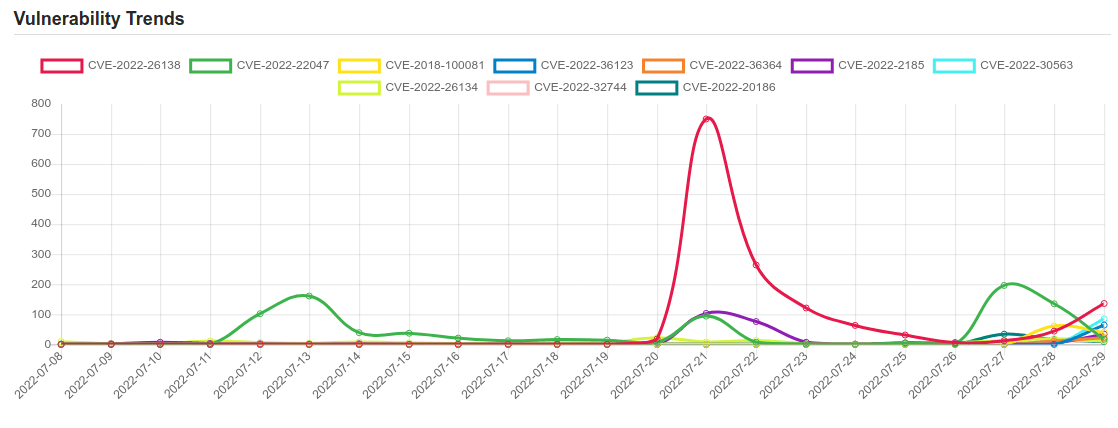Daily Vulnerability Trends: Sat Jul 30 2022

| CVE NAME | CVE Description |
| CVE-2022-32744 | No description provided |
| CVE-2022-20186 | In kbase_mem_alias of mali_kbase_mem_linux.c, there is a possible arbitrary code execution due to improper input validation. This could lead to local escalation of privilege with no additional execution privileges needed. User interaction is not needed for exploitation.Product: AndroidVersions: Android kernelAndroid ID: A-215001024References: N/A |
| CVE-2022-29149 | Azure Open Management Infrastructure (OMI) Elevation of Privilege Vulnerability. |
| CVE-2022-244622 | No description provided |
| CVE-2021-26084 | In affected versions of Confluence Server and Data Center, an OGNL injection vulnerability exists that would allow an unauthenticated attacker to execute arbitrary code on a Confluence Server or Data Center instance. The affected versions are before version 6.13.23, from version 6.14.0 before 7.4.11, from version 7.5.0 before 7.11.6, and from version 7.12.0 before 7.12.5. |
| CVE-2022-2461 | No description provided |
| CVE-2022-2294 | Heap buffer overflow in WebRTC in Google Chrome prior to 103.0.5060.114 allowed a remote attacker to potentially exploit heap corruption via a crafted HTML page. |
| CVE-2022-0342 | An authentication bypass vulnerability in the CGI program of Zyxel USG/ZyWALL series firmware versions 4.20 through 4.70, USG FLEX series firmware versions 4.50 through 5.20, ATP series firmware versions 4.32 through 5.20, VPN series firmware versions 4.30 through 5.20, and NSG series firmware versions V1.20 through V1.33 Patch 4, which could allow an attacker to bypass the web authentication and obtain administrative access of the device. |
| CVE-2021-24911 | No description provided |
| CVE-2022-32742 | No description provided |
| CVE-2022-26712 | This issue was addressed by removing the vulnerable code. This issue is fixed in macOS Monterey 12.4, macOS Big Sur 11.6.6. A malicious application may be able to modify protected parts of the file system. |
| CVE-2022-34906 | A hard-coded cryptographic key is used in FileWave before 14.6.3 and 14.7.x before 14.7.2. Exploitation could allow an unauthenticated actor to decrypt sensitive information saved in FileWave, and even send crafted requests. |
| CVE-2022-26138 | The Atlassian Questions For Confluence app for Confluence Server and Data Center creates a Confluence user account in the confluence-users group with the username disabledsystemuser and a hardcoded password. A remote, unauthenticated attacker with knowledge of the hardcoded password could exploit this to log into Confluence and access all content accessible to users in the confluence-users group. This user account is created when installing versions 2.7.34, 2.7.35, and 3.0.2 of the app. |
| CVE-2022-22047 | Windows CSRSS Elevation of Privilege Vulnerability. This CVE ID is unique from CVE-2022-22026, CVE-2022-22049. |
| CVE-2018-100081 | No description provided |
| CVE-2022-36123 | The Linux kernel before 5.18.13 lacks a certain clear operation for the block starting symbol (.bss). This allows Xen PV guest OS users to cause a denial of service or gain privileges. |
| CVE-2022-36364 | Apache Calcite Avatica JDBC driver creates HTTP client instances based on class names provided via `httpclient_impl` connection property; however, the driver does not verify if the class implements the expected interface before instantiating it, which can lead to code execution loaded via arbitrary classes and in rare cases remote code execution. To exploit the vulnerability: 1) the attacker needs to have privileges to control JDBC connection parameters; 2) and there should be a vulnerable class (constructor with URL parameter and ability to execute code) in the classpath. From Apache Calcite Avatica 1.22.0 onwards, it will be verified that the class implements the expected interface before invoking its constructor. |
| CVE-2022-2185 | A critical issue has been discovered in GitLab affecting all versions starting from 14.0 prior to 14.10.5, 15.0 prior to 15.0.4, and 15.1 prior to 15.1.1 where an authenticated user authorized to import projects could import a maliciously crafted project leading to remote code execution. |
| CVE-2022-30563 | When an attacker uses a man-in-the-middle attack to sniff the request packets with success logging in through ONVIF, he can log in to the device by replaying the user’s login packet. |
| CVE-2022-26134 | In affected versions of Confluence Server and Data Center, an OGNL injection vulnerability exists that would allow an unauthenticated attacker to execute arbitrary code on a Confluence Server or Data Center instance. The affected versions are from 1.3.0 before 7.4.17, from 7.13.0 before 7.13.7, from 7.14.0 before 7.14.3, from 7.15.0 before 7.15.2, from 7.16.0 before 7.16.4, from 7.17.0 before 7.17.4, and from 7.18.0 before 7.18.1. |
A considerable amount of time and effort goes into maintaining this website, creating backend automation and creating new features and content for you to make actionable intelligence decisions. Everyone that supports the site helps enable new functionality.
If you like the site, please support us on Patreon using the button below

To keep up to date follow us on the below channels.





![Cobalt Strike Beacon Detected - 166[.]108[.]234[.]74:8089 7 Cobalt-Strike](https://www.redpacketsecurity.com/wp-content/uploads/2021/11/Cobalt-Strike-300x201.jpg)